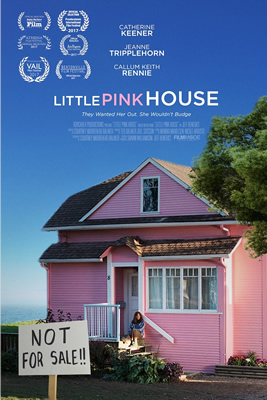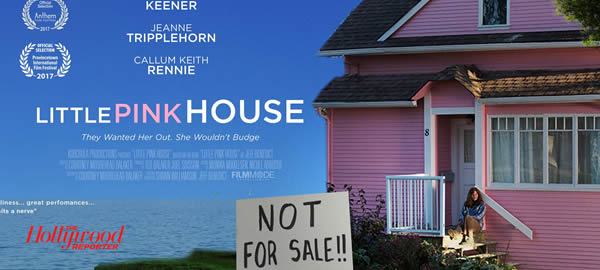Little Pink House opened the Anthem Film Festival, part of FreedomFest, on July 19, at the Paris resort in Las Vegas. The film stars Catherine Keener (Capote, The 40-Year-Old Virgin, Being John Malkovich) and Emmy nominee Jeanne Tripplehorn (Big Love, The Firm, Grey Gardens), and tells the story of Susette Kelo, who led a fight against eminent domain which went all the way to the Supreme Court.
A court case? Like me, you might think that doesn’t sound intriguing. Like me, you’d be wrong.

Before the screening, I spoke to screenwriter/director Courtney Balaker (Can We Take a Joke? ). I asked her how one approaches a story and maintains drama when people know how the story ends? Balaker said that, unlike the people at this libertarian themed film festival, most people at other festivals where not familiar with the case. To the point, she said, “Like any true story, it’s all about how events impact people’s lives and how they fight back.”
The story and the film, based on the book, Little Pink House, by Jeff Benedict, did not disappoint. The screening was followed by a question and answer session with creators of the film and the real people involved in the story.
The Little Pink House Story
Susette Kelo was a small-town nurse who found her dream home in a working-class neighborhood in New London, Connecticut. We meet Kelo, played by Catherine Keener, as she is working with EMT’s on an ambulance. We watch her bond with people in her new town and fix up her property.

(Photo courtesy of ‘Little Pink House’)
Unbeknownst to Kelo, while she was becoming a part of the community, others were working to kick her and her neighbors out. New London, with the help of the state governor, recruited a college professor, played by Jeanne Tripplehorn, to head a redevelopment agency. The agency’s purpose was to use eminent domain to condemn Kelo’s neighborhood and turn it over to drug manufacturer Pfizer, who planned to build a laboratory there.
Eminent domain traditionally has allowed government to obtain property for roads, schools and other community enhancing projects. Whether this power could be used to turn over property to a private company became the crux of the lawsuit which ended up in the law books as Kelo v. City of New London. In Susette Kelo’s life, it ended up taking her from quiet nurse to leader of a working-class movement which has had an impact on the entire country.
Keener’s and Tripplehorn’s performances show two sides of how people swept up in politics and cronyism struggle to maintain their rights and their integrity. Balaker’s direction struck just the right balance between heroism and pathos, revealing the interplay of personal and public lives. The dialogue felt incredibly real. I cannot imagine anyone who would not be swept up into the issues and heartbreak of this story. I have a new favorite director.
The Little Pink House People
After the screening of the film, Courtney Balaker, her husband Ted who produced the film, the real Susette Kelo, and Scott Bullock and John Kramer of the Institute for Justice, which handled the case, discussed their legal and creative journeys.

behind ‘Little Pink House’
Kelo had great praise for Bullock and the Institute for Justice. “When Scott first took our case,” she said. “He was our knight in shining armor. He never deserted us. He stood by our side.”
Bullock commented that he felt that the struggle was not in vain. “Telling this story, to know the true cost of government abuse, is important to every generation,” he said. “They need to say, ‘I will not let this happen to me.’” He also pointed out that because of the Kelo v. City of New London decision, 40 states have passed laws protecting property owners from eminent domain misuse.
The film has been screening at film festivals around the country, and according to Courtney Balaker, they should have distribution by the fall.

‘Little Pink House’ at Anthem Film Festival
Producer Ted Balaker said the film was an important way of reaching out to people who might not otherwise be exposed to the liberty message. He said that after the film screened in Provincetown, Massachusetts, residents were inspired to oppose and reverse a local issue similar to Kelo’s.
“Every city has a little pink house,” he concluded, “and we want to help prevent happening again what happened to Susette.”
At the end of the festival, Little Pink House won the FreedomFest Grand Prize and Best Narrative Feature awards. Composers of the film’s music, Scott McRae and Ryan Rapsys of Music for Liberty, won the Award for Best Original Score.
For more information about Little Pink House and where and when you can see it, check its Facebook page or Twitter feed (@LPHmovie ). A clip featuring Catherine Keener is linked below.




